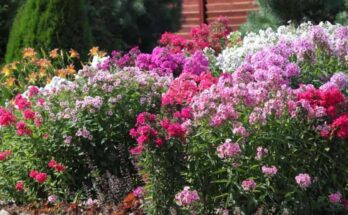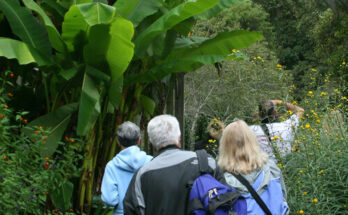Yesterday we visited Chad and Seyra’s garden in Woodbury, Connecticut, and today we’re back to see more of their beautiful plants.
 Like a lot of other gardeners, we love the birds who come to our garden. Over the years, we have increasingly considered their needs when selecting new plants. But choosing coneflowers was a happy accident. We love Echinacea purpurea (Zones 3–8) because it is easy to grow, seeds itself around, blooms for months, comes in one of my favorite colors (pink), and just so happens to be popular with the birds and insects. It’s a total win-win! I like to mix them with other pink plants that have different shapes, like Pennisetum orientale ‘Karley Rose’ (Zones 5–8), and Sanguisorba hakusanensis ‘Lilac Squirrel’ (Zones 4–8).
Like a lot of other gardeners, we love the birds who come to our garden. Over the years, we have increasingly considered their needs when selecting new plants. But choosing coneflowers was a happy accident. We love Echinacea purpurea (Zones 3–8) because it is easy to grow, seeds itself around, blooms for months, comes in one of my favorite colors (pink), and just so happens to be popular with the birds and insects. It’s a total win-win! I like to mix them with other pink plants that have different shapes, like Pennisetum orientale ‘Karley Rose’ (Zones 5–8), and Sanguisorba hakusanensis ‘Lilac Squirrel’ (Zones 4–8).
 Here’s one of those birds now. The goldfinches are just one of the many species who adore this plant!
Here’s one of those birds now. The goldfinches are just one of the many species who adore this plant!
 The ponds and containers allow us to grow various water plants like lotus and water lilies. This miniature water lily, Nymphaea ‘Helvola’ (Zones 4–10) is perfectly proportional to the little froglet emerging from the small container that served as his nursery. Venture forth into the wide world, brave little one!
The ponds and containers allow us to grow various water plants like lotus and water lilies. This miniature water lily, Nymphaea ‘Helvola’ (Zones 4–10) is perfectly proportional to the little froglet emerging from the small container that served as his nursery. Venture forth into the wide world, brave little one!
 We also collect Brugmansia (Zones 8–10) because who could resist a Brug! We pack our basement to the ceiling with these behemoths every fall, knowing it’ll be totally worth it in the summer to have this!
We also collect Brugmansia (Zones 8–10) because who could resist a Brug! We pack our basement to the ceiling with these behemoths every fall, knowing it’ll be totally worth it in the summer to have this!
 This is Brugmansia ‘Charles Grimaldi.’ There’s something about lying on the grass underneath and gazing up into the fragrant trumpets that can erase your worries. These Brugs need lots of water and fertilizer and sturdy supports to stay happy and upright in their pots. Our yard is very windy, and these top-heavy pots often get knocked over unless we brace them with pieces of rebar. In this photo we are using a repurposed rebar plant support. Monty Don taught us that you can buy your own rebar and bend it to make your own sturdy supports. We bend it around the trunks of trees to shape them.
This is Brugmansia ‘Charles Grimaldi.’ There’s something about lying on the grass underneath and gazing up into the fragrant trumpets that can erase your worries. These Brugs need lots of water and fertilizer and sturdy supports to stay happy and upright in their pots. Our yard is very windy, and these top-heavy pots often get knocked over unless we brace them with pieces of rebar. In this photo we are using a repurposed rebar plant support. Monty Don taught us that you can buy your own rebar and bend it to make your own sturdy supports. We bend it around the trunks of trees to shape them.
 Every year we worry about the wildfires out west where our loved ones live. The smoke even drifts all the way out to Connecticut, sometimes making it hard to see the hills in the distance. But the smoke has a way of intensifying our sunsets like nothing else I’ve seen. These beautiful sunsets are so bittersweet.
Every year we worry about the wildfires out west where our loved ones live. The smoke even drifts all the way out to Connecticut, sometimes making it hard to see the hills in the distance. But the smoke has a way of intensifying our sunsets like nothing else I’ve seen. These beautiful sunsets are so bittersweet.
 In this photo, Rudbeckia fulgida (Zones 3–9) and Echinops bannaticus ‘Blue Glow’ (Zones 4–9) are backed by an intense sunset.
In this photo, Rudbeckia fulgida (Zones 3–9) and Echinops bannaticus ‘Blue Glow’ (Zones 4–9) are backed by an intense sunset.
 I could never say which season is my favorite, but fall has a special place in my heart. It’s as if fall is the garden’s grand finale thanking us for our hard work and bidding farewell until spring. We purposefully plant for fall colors. The native New England flora give us a head start with that. And we try to echo those colors in the garden.
I could never say which season is my favorite, but fall has a special place in my heart. It’s as if fall is the garden’s grand finale thanking us for our hard work and bidding farewell until spring. We purposefully plant for fall colors. The native New England flora give us a head start with that. And we try to echo those colors in the garden.
 We dug up our entire previous garden and brought it with us when we relocated. That first summer, we frantically planted things anywhere we could shoehorn them in to help the plants make it through their first winter. This photo shows that even in those early chaotic plantings, the plants found a way to find the right partners and shine anyway. I’m going to take that as proof of my theory that the more cool plants you collect, the higher probability that the plants will magically assemble themselves into a beautiful composition requiring no effort on the part of the gardener.
We dug up our entire previous garden and brought it with us when we relocated. That first summer, we frantically planted things anywhere we could shoehorn them in to help the plants make it through their first winter. This photo shows that even in those early chaotic plantings, the plants found a way to find the right partners and shine anyway. I’m going to take that as proof of my theory that the more cool plants you collect, the higher probability that the plants will magically assemble themselves into a beautiful composition requiring no effort on the part of the gardener.
 I am a huge fan of Patrinia scabiosifolia (Zones 5–8). It grows easily from seed, produces tall acid-yellow umbels beloved by pollinators, and has foliage that turns shades of red in the fall. What a workhorse of a plant! I’ll never be without it again. Behind it is Rudbeckia triloba (Zones 4–8). We rely heavily on self-seeding plants like these to fill in our empty spaces. We love the generosity of these plants. They give so much and ask nothing in return.
I am a huge fan of Patrinia scabiosifolia (Zones 5–8). It grows easily from seed, produces tall acid-yellow umbels beloved by pollinators, and has foliage that turns shades of red in the fall. What a workhorse of a plant! I’ll never be without it again. Behind it is Rudbeckia triloba (Zones 4–8). We rely heavily on self-seeding plants like these to fill in our empty spaces. We love the generosity of these plants. They give so much and ask nothing in return.
Check out more of this garden on Instagram: @s2szahme
Have a garden you’d like to share?
Have photos to share? We’d love to see your garden, a particular collection of plants you love, or a wonderful garden you had the chance to visit!
To submit, send 5-10 photos to [email protected] along with some information about the plants in the pictures and where you took the photos. We’d love to hear where you are located, how long you’ve been gardening, successes you are proud of, failures you learned from, hopes for the future, favorite plants, or funny stories from your garden.
Have a mobile phone? Tag your photos on Facebook, Instagram or Twitter with #FineGardening!
Do you receive the GPOD by email yet? Sign up here.
Source link
Originally posted 2022-12-16 21:07:56.




